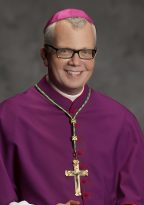
By Bishop Donald J. Hying | OSV News
Promulgated Aug. 6, 1993, by St. John Paul II, “Veritatis Splendor” is the holy pontiff’s articulation of Catholic moral principles. It views the moral life through the lens of the rich young man, who comes to Christ asking what he must do to inherit eternal life.
This question of knowing what moral action to take is the fundamental response to an encounter with God and his word. Once a person comes to understand that God is his ultimate and supreme good, the discernment of knowing how to act in a way which is convergent with the true, good and beautiful becomes imperative.
Similar to the rich young man’s question, both the crowds who hear the preaching of St. John the Baptist in the desert, and those who hear Simon Peter proclaiming the kerygma on Pentecost, are cut to the heart and respond with the same question: What must I do?
Jesus tells the young man to keep the commandments, reminding us that the Ten Commandments give us a fundamental moral road map to embrace the good and eschew evil. Entrusted to Moses by God himself, the Decalogue is both a supernatural revelation of divine teaching to guide our moral decision-making, but also points to the primacy of the natural law, written on the human heart. Man comes to know the good, both through the voice of conscience within himself and also through God’s Word, spoken through history. We need to turn to Christ, as the rich young man did, to know good and evil.
St. John Paul reminds us that our ultimate purpose is to live for the praise of God’s glory. In this context, the moral life becomes the response to the gracious love of God, which has been made manifest in Jesus Christ in an absolute and saving way. Guided by the church’s magisterium, obliged to form his or her conscience in the truth, and graced with the efficacious power of the sacraments, a Christian has the capacity to know the good and to act upon it.
In an age which diminishes or even denies the existence of absolutes, the human capacity to apprehend that truth and the moral ability to live it, the pope reminds us of our capacity for heroic sanctity and sacrificial goodness, if we cooperate with the grace offered us.
When the rich young man tells Christ that he has kept all the commandments and asks what he still lacks, the Lord invites him to sell all he has and to follow him. This desire to go further in the moral life, to exceed the prescriptions of the law through a life of heroic charity and goodness, finds its expression in the Beatitudes, which the encyclical describes as “basic attitudes and dispositions in life.” John Paul II sees a complementarity between the Commandments and the Beatitudes. The Decalogue commands us to love God and to do no harm to our neighbor; the Beatitudes open us to the “horizon of perfection.”
We can easily see the integrated beauty of the moral life exemplified in the lives of the saints, who show us the symmetry of the Ten Commandments and the Gospel, as they poured their hearts out in radical self-emptying love.
From the beginning of the church, the apostles and church fathers lay out the intrinsic unity and harmony of faith and life for a Christian, expressed in particular moral actions. The unity and witness of the church suffers damage, “not only by Christians who reject or distort the truths of faith but also by those who disregard the moral obligations to which they are called by the Gospel,” St. John Paul wrote. We see the sad consequences of the disconnect between faith and life all around us, by those who reject all religious and moral principles and by those who seek to remain in the church but redefine her teachings to match their life choices and relationships.
St. John Paul seeks to outline the principles necessary for “discerning what is contrary to sound doctrine” and to answer some fundamental questions: “What is man? What is the meaning and purpose of our life? What is good and what is sin? What origin and purpose do sufferings have? What is the way to attain true happiness? What are death, judgment and retribution after death? … What is freedom and what is its relationship to the truth contained in God’s law? What is the role of conscience in man’s moral development”?
The divine revelation given to us by God and entrusted to the church answers all of these questions. The moral law is the North Star that guides us to salvation in Christ as we seek to embrace and live the good.
– – –
Bishop Donald J. Hying is bishop of the Diocese of Madison, Wisconsin.
Feature photo courtesy of OSV News.






















